Below are the list of Latest JAVA Programing Books for freshers beginners and experienced pdf free download.
1. Data Structures and Algorithms with Object-Oriented Design Patterns in Java
Author : Bruno R. Preiss
Download : http://www.brpreiss.com/books/opus5/index.html
Description : Great book to learn data structure and algorithm in Java programming language. Filled with lots of simple but non trivial examples of implementing different data structures e.g. stack, queue, linked list in Java. Since data structure and algorithm are very very important for any Java programmer and quite a common topic in Java interview, it is absolutely must to have a strong command in both. If you are preparing for Java job interviews then you can also take a look at some of my favorite algorithm and data-structures questions, it may help in your preparation. If you like to read paperback edition, you can order it from Amazon as well.
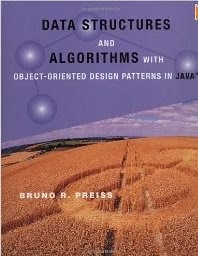 2. Java Application Development on Linux
2. Java Application Development on Linux
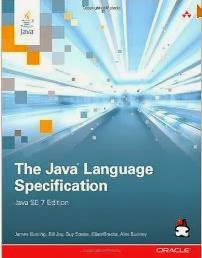
JAVA Programing Books for beginners & Experienced
1. Data Structures and Algorithms with Object-Oriented Design Patterns in Java
Author : Bruno R. Preiss
Download : http://www.brpreiss.com/books/opus5/index.html
Description : Great book to learn data structure and algorithm in Java programming language. Filled with lots of simple but non trivial examples of implementing different data structures e.g. stack, queue, linked list in Java. Since data structure and algorithm are very very important for any Java programmer and quite a common topic in Java interview, it is absolutely must to have a strong command in both. If you are preparing for Java job interviews then you can also take a look at some of my favorite algorithm and data-structures questions, it may help in your preparation. If you like to read paperback edition, you can order it from Amazon as well.

Author : Carl Albing and Michael Schwarz
Download : http://javalinuxbook.com/
Description : A perfect Java book, if you are developing or running Java application on Linux environment, which is the case in most of the investment banks. You can download entire books as PDF, along with all example programs. Carl Albing and Michael Schwarz has done excellent job to to put everything needed to run and support a Java program in Linux environment including how to start, stop, or kill Java process, checking logs with some handy useful UNIX commands. Paperback edition of this book is also available here in Amazon.
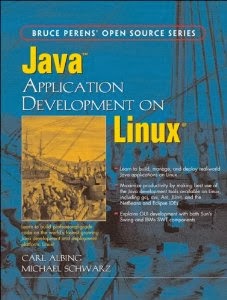
3.Core Servlets and JavaServer Pages
Author : by Marty Hall and Larry Brown
Download : http://pdf.coreservlets.com/
Description : Servlets and JSP are fundamental Java technologies for developing web applications in Java. Core Servlets and Java Server Pages, teaches you basics of these technologies. You can access all chapter of this book as FREE PDF online, they are also available for download. Good thing about this Java books, is that source code and lecture notes are also available for FREE download. If you like to read paper book than you can also purchase, paperback edition of this book here
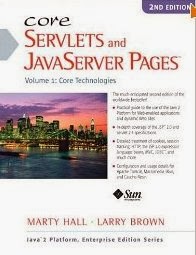 4. The Java Language Specification, Java SE 7 Edition (Java Series)
4. The Java Language Specification, Java SE 7 Edition (Java Series)
Author : James Gosling, Bill Joy, Guy L. Steele Jr., Gilad Bracha, Alex Buckley (Author)
Download : http://docs.oracle.com/javase/specs/jls/se7/jls7.pdf
Description : Official Java language specification for Java SE 7 edition is available online to view as HTML and download as PDF. This is the best FREE resource in Java, as it's from source and contains most up-to-date details about Java Programming language. If you like paperback edition, you can also purchase this books from amazon here.
Download : http://javalinuxbook.com/
Description : A perfect Java book, if you are developing or running Java application on Linux environment, which is the case in most of the investment banks. You can download entire books as PDF, along with all example programs. Carl Albing and Michael Schwarz has done excellent job to to put everything needed to run and support a Java program in Linux environment including how to start, stop, or kill Java process, checking logs with some handy useful UNIX commands. Paperback edition of this book is also available here in Amazon.

3.Core Servlets and JavaServer Pages
Author : by Marty Hall and Larry Brown
Download : http://pdf.coreservlets.com/
Description : Servlets and JSP are fundamental Java technologies for developing web applications in Java. Core Servlets and Java Server Pages, teaches you basics of these technologies. You can access all chapter of this book as FREE PDF online, they are also available for download. Good thing about this Java books, is that source code and lecture notes are also available for FREE download. If you like to read paper book than you can also purchase, paperback edition of this book here

Author : James Gosling, Bill Joy, Guy L. Steele Jr., Gilad Bracha, Alex Buckley (Author)
Download : http://docs.oracle.com/javase/specs/jls/se7/jls7.pdf
Description : Official Java language specification for Java SE 7 edition is available online to view as HTML and download as PDF. This is the best FREE resource in Java, as it's from source and contains most up-to-date details about Java Programming language. If you like paperback edition, you can also purchase this books from amazon here.

5. The Java Virtual Machine Specification, Java SE 7 Edition
Author : Tim Lindholm, Frank Yellin, Gilad Bracha, Alex Buckley
Download : http://docs.oracle.com/javase/specs/jvms/se7/jvms7.pdf
Description : Knowledge of Java Virtual Machine is very important for experienced Java developers, to get maximum out of JVM and avoid unnecessary optimization, which can be effectively done by JIT and JVM. For a beginner, It's too much ask, to know more about JVM, but since it's a free Java book, you can always download PDF and read it. Paperback edition of this Java book is also available for purchase in Amazon, here.
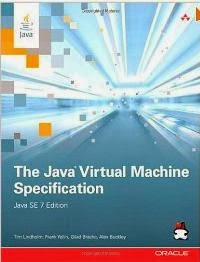 6. The Java Tutorial: A Short Course on the Basics (5th Edition)
6. The Java Tutorial: A Short Course on the Basics (5th Edition)
Author : Sharon Biocca Zakhour, Sowmya Kannan, and Raymond Gallardo
Download : http://www.oracle.com/technetwork/java/javase/downloads/java-se-7-tutorial-2012-02-28-1536013.html
Description : This is the official Java tutorials from Oracle, which explains different Java concepts in form of short courses e.g. JDBC, JMX, JAXB. All tutorials are available online and you can also download them for free as eBook, available in both .mobi and .epub format, nice to read in iPhone and android phones. If you love paperback edition, you can also order it from Amazon. By the way, these tutorials are really good quality and great way to explore different features of Java Programming language.
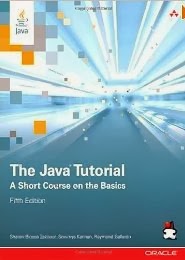 7. Thinking in Java 3rd edition
7. Thinking in Java 3rd edition
Author : Bruce Eckel
Download : http://www.mindview.net/Books/TIJ/
Description : Thinking in Java is a Jolt Award winner and one of the classic book to learn Java programming. Third edition of this books is freely available for download and you can download them as PDF format for offline read. By the way, fourth edition of this book is also available which covers most of new Java 5 concepts in detail, but it's NOT FREE. you can purchase that from Amazon. One more thing, first six chapters of Thinking in Java 4th edition is also available in PDF format for free download.
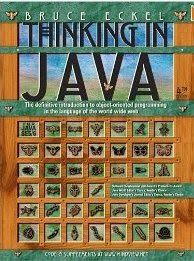 8. Introduction to Programming Using Java, Sixth Edition
8. Introduction to Programming Using Java, Sixth Edition
Author : David J. Eck
Download : http://math.hws.edu/javanotes/
Description : This is another free Java book, which is available in both PDF and HTML format and teaches programming basics using Java programming language. I liked there chapter on Linked Data structure and Recursion, which teaches some of the key programming concept with simple, non trivial Java examples. You can also purchase paperback edition of this book on Amazon .
 9. Processing XML with Java (A Guide to SAX, DOM, JDOM, JAXP, and TrAX
9. Processing XML with Java (A Guide to SAX, DOM, JDOM, JAXP, and TrAX
Author : Elliotte Rusty Harold
Download : http://www.cafeconleche.org/books/xmljava/
Description : XML is one of the most desirable skill along with Java. You often need to work with XML files in large projects, as it's one of the most widely used data transport format. This Java book is a comprehensive and up-to-date collection of various XML technology and how to use them with Java programming language. You will learn about different XML parsers e.g. SAX and DOM, JDOM, XPATH and XSLT etc. If your work involve, XML and Java, then this is the book you should read. This Java book is freely available for online read, and you can buy paperback edition from any book store including Amazon.
10. Think Java (How to Think Like a Computer Scientist)
Author : by Allen B. Downey
Download : http://greenteapress.com/thinkapjava/
Description : Don't confuse this book with Thinking in Java, it's different one. This is another great Java book for beginners which is available for FREE. You can download it as PDF or read it online in there site. It covers programming basics, object oriented concepts, essential software development technique, debugging etc. It's actually tailored for students, who wants to give Computer Science advanced placement (AP) exam, but turn out be a great book for any beginner. If you just started learning Java, give it a try. Paperback edition of this book is available in Amazon here.
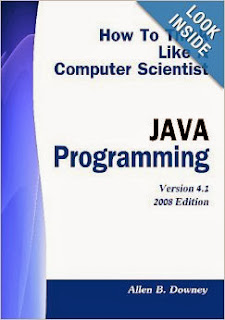 That's all guys, these are some really useful FREE Java books. As we all love free resources, go download them as PDF or view online them as HTML. If you have slow Internet connection, then it's better to download PDF eBooks and read them offline. By the way, nothing can substitute a paperback book, eBooks are good but not for continuous reading. So don't forget to have a paperback edition of at least one Java book, when you start learning Java. If you are absolute beginner then buy Head First Java.
That's all guys, these are some really useful FREE Java books. As we all love free resources, go download them as PDF or view online them as HTML. If you have slow Internet connection, then it's better to download PDF eBooks and read them offline. By the way, nothing can substitute a paperback book, eBooks are good but not for continuous reading. So don't forget to have a paperback edition of at least one Java book, when you start learning Java. If you are absolute beginner then buy Head First Java.
Author : Tim Lindholm, Frank Yellin, Gilad Bracha, Alex Buckley
Download : http://docs.oracle.com/javase/specs/jvms/se7/jvms7.pdf
Description : Knowledge of Java Virtual Machine is very important for experienced Java developers, to get maximum out of JVM and avoid unnecessary optimization, which can be effectively done by JIT and JVM. For a beginner, It's too much ask, to know more about JVM, but since it's a free Java book, you can always download PDF and read it. Paperback edition of this Java book is also available for purchase in Amazon, here.

Author : Sharon Biocca Zakhour, Sowmya Kannan, and Raymond Gallardo
Download : http://www.oracle.com/technetwork/java/javase/downloads/java-se-7-tutorial-2012-02-28-1536013.html
Description : This is the official Java tutorials from Oracle, which explains different Java concepts in form of short courses e.g. JDBC, JMX, JAXB. All tutorials are available online and you can also download them for free as eBook, available in both .mobi and .epub format, nice to read in iPhone and android phones. If you love paperback edition, you can also order it from Amazon. By the way, these tutorials are really good quality and great way to explore different features of Java Programming language.

Author : Bruce Eckel
Download : http://www.mindview.net/Books/TIJ/
Description : Thinking in Java is a Jolt Award winner and one of the classic book to learn Java programming. Third edition of this books is freely available for download and you can download them as PDF format for offline read. By the way, fourth edition of this book is also available which covers most of new Java 5 concepts in detail, but it's NOT FREE. you can purchase that from Amazon. One more thing, first six chapters of Thinking in Java 4th edition is also available in PDF format for free download.

Author : David J. Eck
Download : http://math.hws.edu/javanotes/
Description : This is another free Java book, which is available in both PDF and HTML format and teaches programming basics using Java programming language. I liked there chapter on Linked Data structure and Recursion, which teaches some of the key programming concept with simple, non trivial Java examples. You can also purchase paperback edition of this book on Amazon .

Author : Elliotte Rusty Harold
Download : http://www.cafeconleche.org/books/xmljava/
Description : XML is one of the most desirable skill along with Java. You often need to work with XML files in large projects, as it's one of the most widely used data transport format. This Java book is a comprehensive and up-to-date collection of various XML technology and how to use them with Java programming language. You will learn about different XML parsers e.g. SAX and DOM, JDOM, XPATH and XSLT etc. If your work involve, XML and Java, then this is the book you should read. This Java book is freely available for online read, and you can buy paperback edition from any book store including Amazon.
10. Think Java (How to Think Like a Computer Scientist)
Author : by Allen B. Downey
Download : http://greenteapress.com/thinkapjava/
Description : Don't confuse this book with Thinking in Java, it's different one. This is another great Java book for beginners which is available for FREE. You can download it as PDF or read it online in there site. It covers programming basics, object oriented concepts, essential software development technique, debugging etc. It's actually tailored for students, who wants to give Computer Science advanced placement (AP) exam, but turn out be a great book for any beginner. If you just started learning Java, give it a try. Paperback edition of this book is available in Amazon here.


